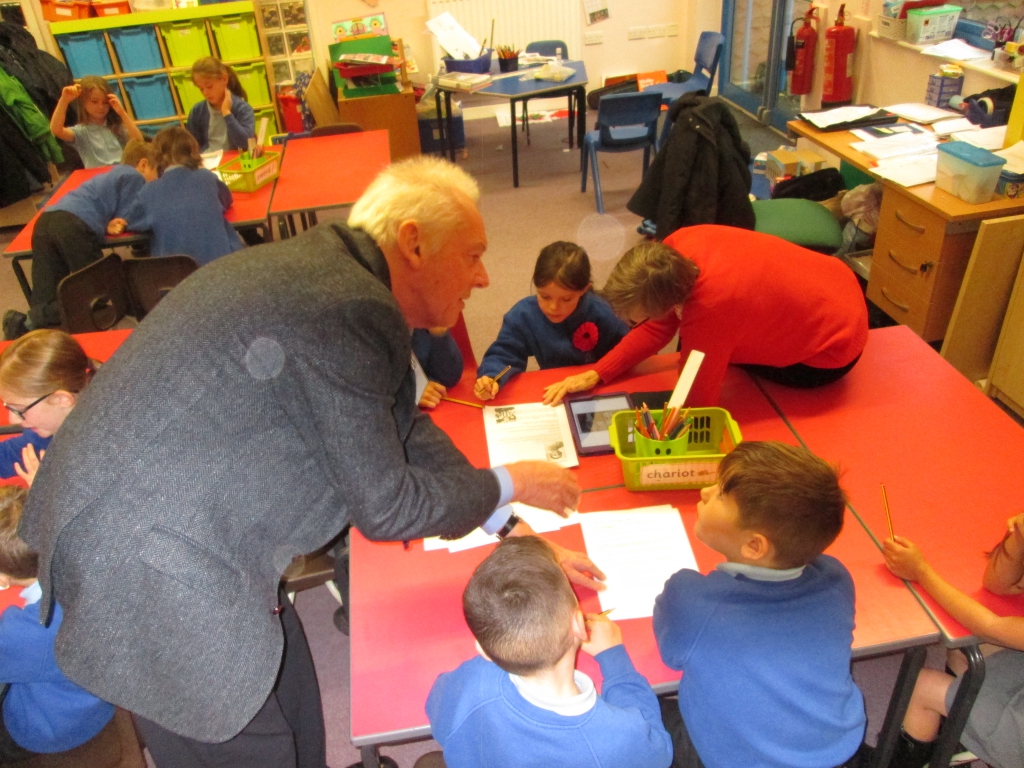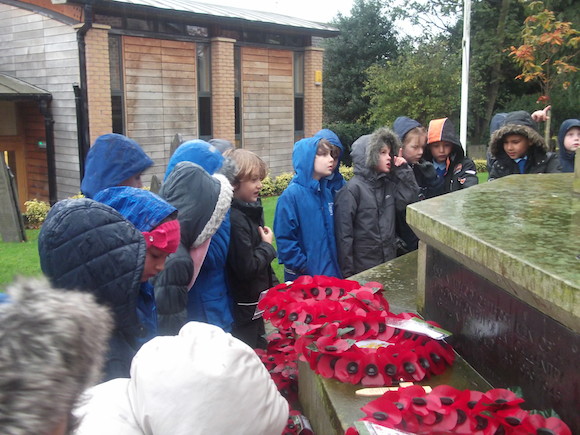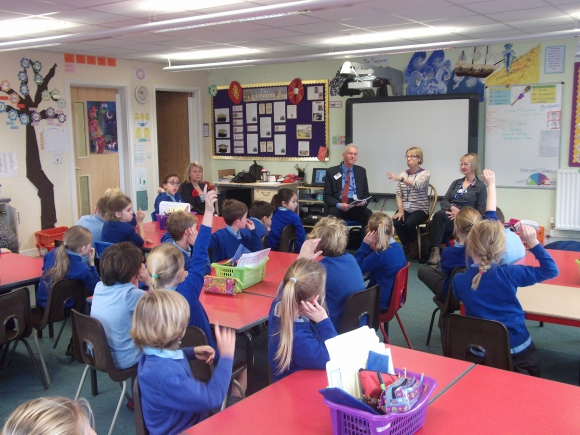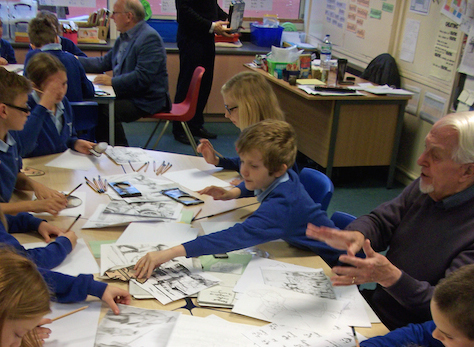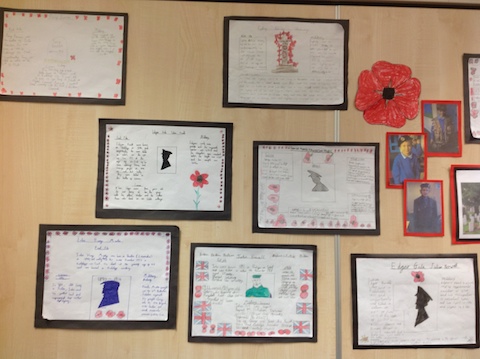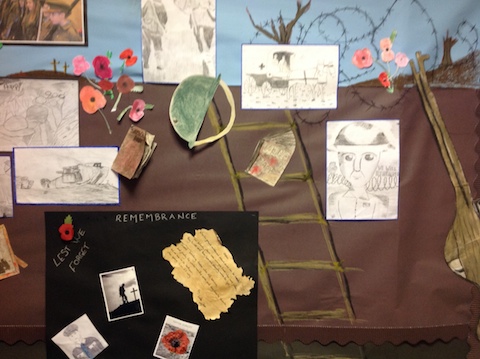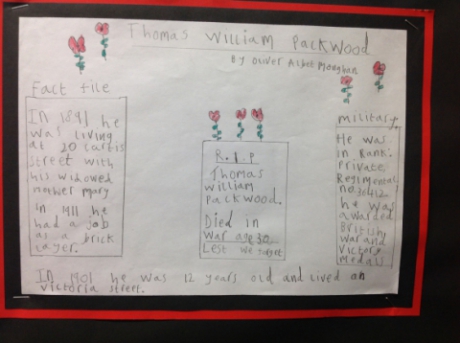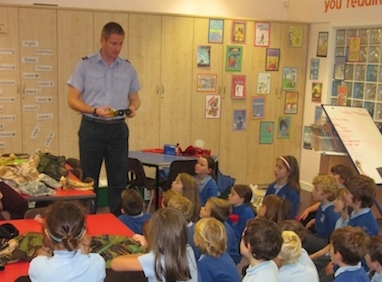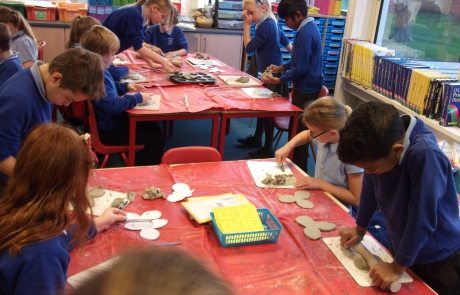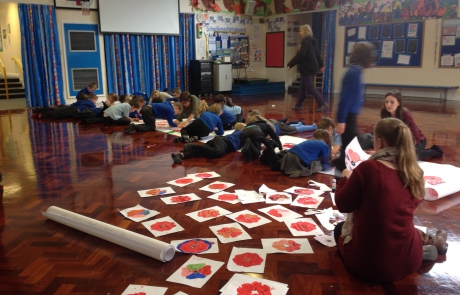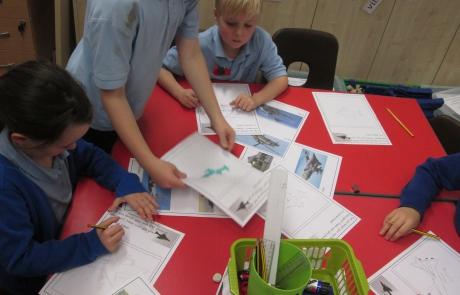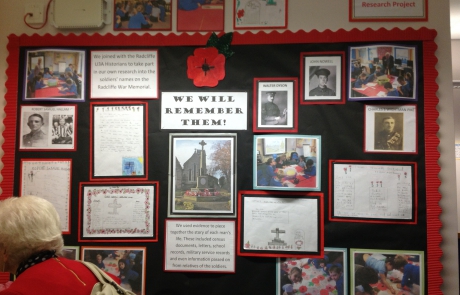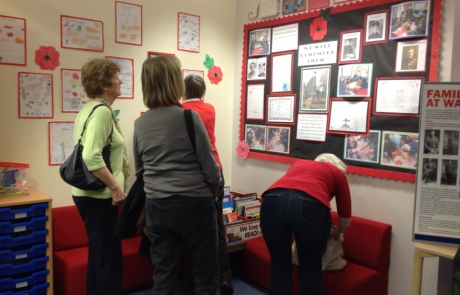Radcliffe on Trent Junior School
WWI Project
In November 2014 Radcliffe Junior School carried out a major project on the Great War, involving all pupils in years 3-6. The Radcliffe U3A WWI project team were invited into school to work with pupils and staff. They attended lessons, discussed the war with the children and answered their often difficult questions. Several pupils had visited the ‘Blood Swept Lands and Sea of Red’ installation at the Tower of London and been in the local Remembrance Sunday parade so the war was fresh in their minds.
Radcliffe Junior School Staff said:
“With 4th August 2014 marking 100 years since Britain’s involvement in World War I, as a school we planned an entire week of activities focused around learning, thinking, questioning, re-enacting, commemorating as well as celebrating the achievements and sacrifices of World War I. The week began with a visit by each class to the Radcliffe-on-Trent memorial”.
WWI Research
“The children then worked in class groups with the expert guidance of members from the U3A research team, to research one name each from the memorial. This really captured the children’s attention as these soldiers were no longer simply names on a memorial, but individuals with everyday lives, homes, jobs and family situations. They also examined various sources including census documents, service records and photos provided by families and local people.”
Questions the children asked about particular soldiers included:
What was his favourite weapon?
Did he drive a tank?
Which football team did he support?
Did he make friends easily?
How upset was his mother when he was killed?
“At the end of the session each group had created their own piece of writing and fed back to the class, introducing the soldier and all they had discovered about their lives before and during the war.”
The children were curious to know more about the war. Their far ranging questions covered the following:
Fighting:
How did they know when to start fighting?
Did they fight during the night?
How did they go to the toilet when they were fighting?
Where did they keep the ammunition in the plane?
How did they fire guns from aircraft and miss the propeller?
Trench warfare:
How do you dig a trench and not get shot?
How did they get out of the trenches? Was it like a maze?
Where did you sleep?
How did you get your food? Did they eat off silver dishes?
What did they do in the evening?
Weapons:
Which side had the best weapons?
Did the Germans have the same guns or a different sort?
Did they fight with swords?
Did ladies fly jets?
How many tanks were there in the war?
Did they strap gelignite to dogs and make them run under the tanks to blow them up?
Wounded:
What were the most common wounds?
What happened if you were riding a horse and you were wounded? What did the horse do?
How many diseases could you get?
Did men get wounded on purpose so they could go home?
They were also anxious to know how the war affected Radcliffe:
Did people from the really posh houses in Radcliffe go and fight?
How old was the oldest person in Radcliffe who was in the army?
Which houses in Radcliffe were turned into hospitals?
Did they have enough food in Radcliffe during the war?
How did the women manage the farm work?
Why did the headmaster at Radcliffe school go and fight? Was he really old?
Other Activities
“Our children took part in various art activities including: making clay poppies, creating stop-motion animations, a tapestry of remembrance, sketching images of World War I with guidance from the U3A Grange Art Group as well as creating a large banner which is now displayed in the school hall (see home page for photo of the banner).The children had the chance to examine artefacts from the war period, view the Radcliffe Remembers exhibition on display in the school library as well as learning and performing war time songs. A visit from a member of the RAF gave the children the opportunity to learn about war in the 21st century.”
“The week of remembrance was concluded with a very special remembrance service during which the children’s work was shown. We observed a two minute silence and an address was given by Rev. Graham; members of the local British Legion also attended the service. This was a very fitting end to a week where we had discovered the extent to which war can affect an entire community and change life for future generations”.
Evaluation
The children’s research developed their understanding of war and its consequences. The questions below show how deeply they had thought about the topic:
Why was there a war? Why did it end? Who won?
How many German soldiers died?
Why were they fighting in France?
Could you run away if you didn’t want to fight?
Did you still have to fight if you didn’t want to kill anybody?
What did the countryside look like when the war ended?
Would the war have ended sooner if both sides spoke the same language and they could understand each other?
Reflecting on their experience, the children said:
‘For WWI week we wrote about soldiers from Radcliffe, I learned lots of things about soldiers that I never knew before. We found out what it would have been like to live through a war and I don’t think I’d like to have lived at that time because life was difficult and scary. We also listened to an air-raid siren. It was very loud and gave everyone a shock! One of my favourite parts of the week was making fabulous poppies’.
Oliver Monaghan, Year 3
‘One of the lessons we had in WWI week was making fact files on soldiers from the war. Two ladies came in to tell us more about the soldiers and we got to ask loads of questions. Then we had even more facts that we could add to our fact files which made them really interesting’.
Taylor Johnson, Year 4
‘During our remembrance week the Year 5 were split into groups and given a set of instructions for making fabric poppies. We could choose from different fabrics, buttons, and sequins to decorate our poppies and make them special. I felt quite proud of myself when I saw the finished banner with all of the poppies sewn on because it looked awesome! I also enjoyed The Big Draw were we decorated the words “We will remember”. My class concentrated on drawing aircraft and it looked effective because the lettering was in different shades of red. The whole week was really interesting; I learnt lots of new things I hadn’t realised before from the Historians that came into school’.
Ben Royston Year 5
‘I made an animation during WW1 week and it was the first time I had made an animation. We worked in small groups and could use paints, clay and other materials to show images of war. Our animations showed the sadness of wartime. At the start I didn’t feel that confident as it seemed to be a big task to accomplish. But having made the animation I would do it again because the animation was effective and well worth the time it took to create. The remembrance week was very important because we wanted to remember and respect the people involved in the war and realise how our lives are very different today’.
Will Mills Year 6

